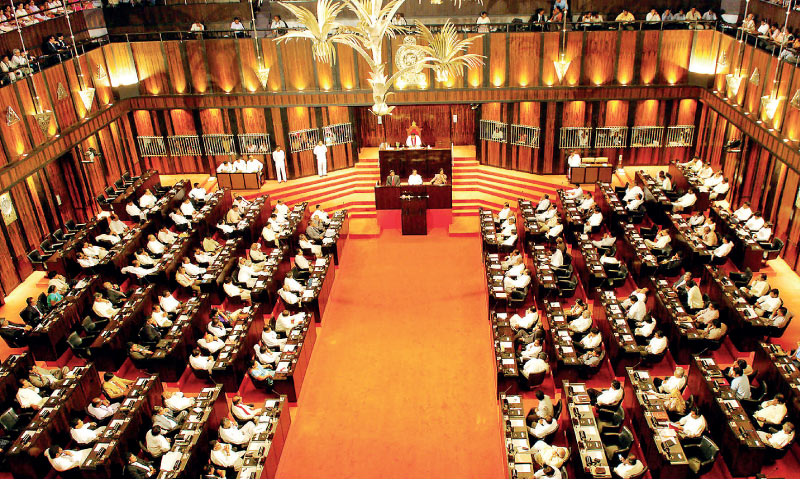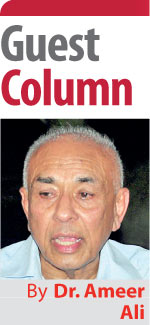Friday Feb 20, 2026
Friday Feb 20, 2026
Monday, 23 May 2022 02:16 - - {{hitsCtrl.values.hits}}

 Just as the term honest politician is an oxymoron, so is the coinage of patriotic opportunism especially in Sri Lankan politics. What Lord Palmerston said in the 19th century that “we have no eternal allies, and we have no perpetual friends”, in the context of British relations with America, was later translated as there are no permanent enemies or friends in politics. Does this mean that opportunism should be the weft that is woven through the warp of political fabric? It need not necessarily be so in a parliamentary democracy with strongly disciplined political parties. But in Sri Lanka’s seven decades of parliamentary democracy political opportunism had flourished.
Just as the term honest politician is an oxymoron, so is the coinage of patriotic opportunism especially in Sri Lankan politics. What Lord Palmerston said in the 19th century that “we have no eternal allies, and we have no perpetual friends”, in the context of British relations with America, was later translated as there are no permanent enemies or friends in politics. Does this mean that opportunism should be the weft that is woven through the warp of political fabric? It need not necessarily be so in a parliamentary democracy with strongly disciplined political parties. But in Sri Lanka’s seven decades of parliamentary democracy political opportunism had flourished.
The so-called All-Party Government’s desperately constituted cabinet and headed by an unelected Prime Minister is a perfect embodiment of Palmerstonian political aphorism, but with one difference. That is, political opportunism had been given, in the words of one of them, “a true patriotic perspective”. RW’s is a cabinet of patriotic opportunists.
The nonelected Prime Minister Ranil Rajapaksa, pardon me, Ranil Wickremesinghe (RW) had been quite forthright in presenting the true picture of the country’s dire economic straits. By August this year, according to him, the country would face food shortage, if not a dreaded famine. The man who engineered this shortage is still there at the helm against a nation backed Aragalaya’s call to quit, and appointing ministers and other aficionados. Petrol, gas, diesel, food, medicine, and, in other words, the vital ingredients that make the people and the country remain mobile and active would be in critical shortage, because of an absence of the almighty dollar to import them.
How to earn this foreign exchange when the nation’s exports except labour are losing foreign markets? Even tourism which is actually the export of the island’s beauty, history and culture, is losing attraction because of political chaos. IMF and friendly countries may help up to a point. But for how long and how much? (I was discussing the economy’s situation with an academic colleague from Bangladesh. He confessed that his country unofficially reckons that the dollars lent to Sri Lanka would never be returned and would be part of his country’s bad debts. I was caught between feelings of shame and gratitude).
In this dire situation, the Governor of CSBL Dr. Nandalal Weerasinghe had boldly threatened domestic dollar hoarders to deposit their hoarding in the banks or exchange it for rupees at a bonus rate or face outright confiscation. This is a call to all wealth accumulators in the country to openly demonstrate their patriotism. It is surprising that NW’s call did not receive sufficient publicity in the country’s official news media. Hoarding is not saving, which also has its own paradox of thrift. Hoarding money involves an unhealthy obsession with the accumulation of financial reserves, and hoarding in any form is detrimental to the flow of economic activities. But hoarding foreign currencies at a time like this in Sri Lanka hijacks the economy and is unpatriotic.
To add meaning to NW’s threat therefore, would all those 225 in Parliament, and particularly members of the All-Party Cabinet, demonstrate their confessed patriotism by heeding to the call and deposit their hoarded dollars in domestic banks? In addition, would they also advise their family members, friends and catchers do the same? Above all, would RW add meaning to NW’s threat and activate the necessary Government agencies to provide information about hoarders? Actually, NW has thrown a gauntlet to RW. Would the PM dare to respond?
This is certainly not going to solve the country’s dollar crisis. But it would be part of a mission to end corruption in the country, which is a cancer that has sapped the vitality of the nation’s economy, and which needs to be removed if the economy were to revive. One would remember the long queues in front of banks in 1970/71 when Dr. N.M. Perera as Minister of Finance demonetised currency notes of larger denomination to catch the hoarders and tax dodgers. What a sight it was to witness people in normal times appeared like beggars standing in the queues to cash their hoardings for new notes?
What NW had proposed adds substance to the system change that lies at the crux of Aragalaya’s demand. Once hoarding and corruption are eradicated powers of the mafia could also be crippled. Even if IMF’s plan of financial stability is implemented in full, without structural changes to the economy, stability and economic growth would remain illusory.
This is the challenge facing RW and his so-called cabinet of patriotic opportunists. Does he have the mindset and resolve to embark on a structural change in the economy? With the reappearance of the Rajapaksas in the legislature the struggle to preserve the status quo would gain new momentum. With that momentum Aragalaya’s original demand, “Gota-Go-Home”, would face the danger of being betrayed and sidetracked by patriotic opportunists who would start appealing to the protestors to work within the system to bring about systemic change. ‘If one cannot change the system join the system’, according to these betrayers. Will the country ever get out of its rot with this type of politicians?
(The writer is attached to Murdoch Business School, Murdoch University, Western Australia.)